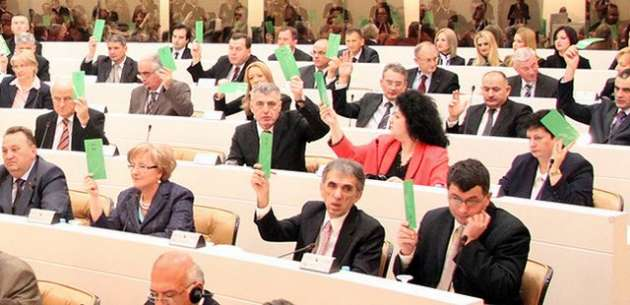
Before passage of the law on whistleblower protection in Bosnia and Herzegovina (BiH), employees of state-level institutions who reported corruption would likely incur the wrath of their employers and be fired, like Višnja Marilović of Sarajevo.
“I hope that no one will go through what I went through after I reported corruption in my work place,” said Marilović, the first whistleblower in public company, Centar Skenderija. Marilović lost her job in 2011 immediately after she reported criminal acts in the company, where she had worked as a bookkeeper for 12 years.
In December 2013, legislation to protect whistleblowers was fully adopted by the BiH Parliament, and on January 1, 2014, it was enacted into law, making BiH one of the first European countries to pass such a law. The law protects individuals employed in state-level institutions who in good faith report corruption at work.
But passage of such a law in BiH was no simple feat. It was the result of a two-year civic advocacy campaign supported by USAID and implemented through close coordination of four of its projects. The organizations most active in advocating for the law are the Center for Responsible Democracy Luna, USAID partner Centers for Civic Initiatives, and NGO members of USAID’s anti-corruption network, ACCOUNT.
Civil society, a multi-party group of parliamentarians, and representatives of BiH institutions worked together to draft and adopt the legislation—a rare event in BiH. This joint effort set an example of how the government and NGOs can work together and address major issues that affect citizens’ lives.
It’s a law whose time has come. Corruption costs approximately $1 billion (1.5 billion Bosnian marks, or BAM) every year. In other words, for every second corruption is tolerated in this country, $30 (47 BAM) is sapped out of the economy, money that could be used for building roads and schools. The result is like imposing a direct tax of $275 (400 BAM) per year on every man, woman and child in BiH.
Unfortunately for Marilović, the law was passed after she was fired from her job. Her fight for justice has been in the courts for three years and has yet to be resolved. But she's still grateful such legal protection now exists in BiH.
“I congratulate all our parliamentarians, especially those who worked together with civil society organizations in the last two years in developing the whistleblower protection law,” said Marilović.







Comment
Make a general inquiry or suggest an improvement.